#and before amok time he was the only vulcan the show had developed so that colors things too
Text






I might make the parallel post later because this isn't the first time the show has highlighted their philosophical differences so plainly, but I will say this: based on other scenes with Spock (The Galileo Seven and Operation: Annihilate immediately come to mind), Vulcan logic is not at all lacking in compassion or sympathy just because they choose to suppress if not purge their emotions. Vulcans are very altruistic based on how Spock continues to see the importance of the alien lifeforms he encounters versus his fellow crewmembers, to the point of arguing for the lifeforms to not be harmed, even in self defense. I realize "the needs of the many outweigh the needs of the few or the one" made its debut in the Wrath of Khan, but based on Spock, it seems like this same principle guides Vulcans through their decisions and interactions (for the most part).
#star trek tos#the immunity syndrome#spock#leonard mccoy#at the end of the day spock and bones is basically the scientist vs the doctor#both are linked together in a pursuit of knowledge but disagree on the aims#of course the other caveat is it's spock. the spiders georg of a vulcan due to his hybrid status + ambassador dad/ancestry#and before amok time he was the only vulcan the show had developed so that colors things too
370 notes
·
View notes
Text
i love star trek bc it's actually a high school theater production most of the time. We focus a lot on the over-acting, theatricality of the actors and the directors, and that's all well and amazing, but /I/ want to focus on the /TECH/ bc ASHAijnjsdnbhgaARREghghhuuagjkshdmhbAHJBSSHJHIEJBnkjsdjhbsdhjBmahbsjshsbHkjnswkjshsn yea.
FIRST THE SETS?!? they're so silly and stupid? i know they get a lot of shit but the amount of work (not to mention styrofoam) that went into building individual sets for each planet they went to? like sure about 50% of the away missions take place in the california desert (the arena, *cough cough*, etc) but the rest of them have individually made sets that look PRETTY GOOD MAN. they get the point across, they're FUN, and innovative, and they really don't reuse planet sets all that often as well.
PLUS they used traditionally /theatrical/ cycloramas with painted backgrounds and classical cyc lighting (reminiscent of mariano fortuny's domed cyc! i WILL talk more about lighting) which look really cool and once again get shit for being unrealistic.
it's not supposed to look realistic it's supposed to look cool as shit. and it does. shut up. <3
if you view the sets as being modern TV sets then yeah, they're weird, and they look sorta bad, but THEYRE NOT modern TV sets: they're THEATRICAL SETS FROM THE 60-70S. AND I LOVE THEM.
SECONDLY, THE
lighting
while it's true that some shows in the 60s were developing new lighting styles specifically for TV, remember that in the year 1950 less that 10 percent of US homes had a television. this shit was new. COLOR tv was ESPECIALLY new. nobody knew how to light these things! and actually why would you need a new lighting style, we already KNEW how to light dramatic productions, why would we ever need to reinvent the wheel Stanley Mccandles, Mariano Fortuny, and Gene Rosenthall already invented says Gene Roddenberry and Jerry Finnerman (the head lighting designer). and oh my god i am so ridiculously glad. because the lighting. is so good.
i HAVE seen others talking about how good it is in the super early episodes (Charlie X and the conscious of the King, etc.) and i do agree! but i disagree that the quality goes down. i think it just got a tad bit more subtle as the show went on and it gets less in your face, harder to notice. but i noticed. because I'M the WORST (and also a lighting tech)
the impossibility of listing every example of amazing theater lighting choice they made is absolutely horrific and nasty so i'll just lost some my my favorites:
the cyc! i mentioned before but the cyc they used on away missions was only painted when they needed a specific scene in the background, otherwise? that bitch was LIT. and i LOVE IT.

any of the scenes where they light spock's face have green and half pink? or even just washing the walls behind him? i eat that shit UP. the METAPHOR. the CONFLICT. i will acquiesce that green and pink are (and were) pretty goddamn industry standard gels (color-films) to add to lights, for subtle contrast, but this is not subtle. it is LOUD. was it purposefully done from a storytelling perspective? no idea. is it cool as shit and interpret-able as hell? absolutely. also sometimes they do it with just green when they want to emphasize his vulcan-ness and other him a bit. like they do it a lot when he's in his room in amok time. anyway.

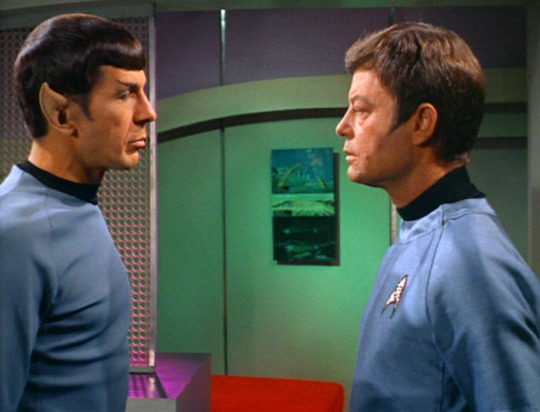
whenever they shutter a light so they can emphasize a character's (kirk, we're talking abt kirk here. and *sometimes* spock, and also Charlie in Charlie X but yeah mostly kirk) eyes when they say something #Deep, or just pre-commercial break closure worthy line. it's so SHJSDJBFEJNKN. to add onto this, they'll do a striking half-wash over half of their face sometimes in conjunction and it looks So Good


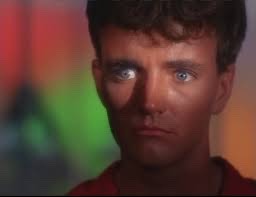
The GOBOS. sometimes, they'll just throw light through a gobo, or wall screen, or something, for /visual interest/ and it looks so silly i love it sm. does it make sense from a realism pov? nO. but star trek is a theater production actually and they lit everything using mainly naturalistic techniques! amazing!
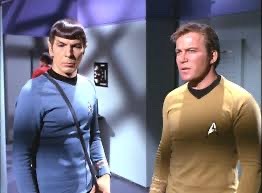
honorable mentions: the glowing time donut, and the entirely random colors in the hallway.
there are so many other examples but this post is long enough lmao. notice the lights next time you watch tos!!,! please!!! <3
#star trek tos#james t kirk#tos spock#enterprise#star trek#set design#lighting#lighting design#theater tech#techies#leonard mccoy#iatse would love this i think#theater lighting
286 notes
·
View notes
Text
Star Trek: Genre and Themes
Considering the fact that Star Trek was pitched as “Wagon Train in space”, it seems almost redundant to discuss the genre of such a show.
Since the beginning, Gene Roddenberry’s show’s genre seemed pretty obvious: science fiction-western. And really, it’s hard to argue with that. Kirk’s style has been outright referred to as ‘cowboy diplomacy’ by future installations of Star Trek. The adventures and ‘exploration’ of the new territory is very reminiscent of the western television shows of the time, and the setting of outer space would seem to place it pretty firmly in the ‘science fiction’ genre as well.
But, like always, there’s a little more to it than that.
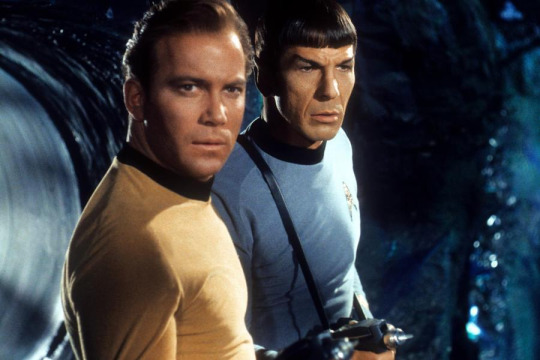
As I’ve mentioned many times before, very few pieces of media can be categorized as only one genre. Even the most seemingly obvious and one-dimensional examples have elements of other genres. No show is designed to fit into only one genre, with any individual television program carrying many characteristics of one specific genre, while sharing many elements of other genres.
And while it may be easy to look at the setting of a film or television show and use that to determine a genre (space = sci-fi, medieval = fantasy), that doesn’t mean it’s terribly accurate.
Such is the case of Star Trek.
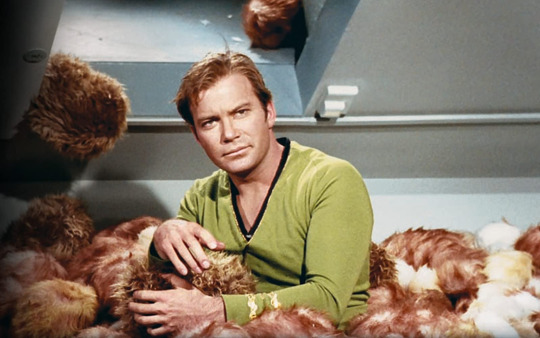
As a matter of fact, despite Roddenberry’s initial pitch to the studios, Star Trek actually doesn’t have a whole lot in common with the westerns of the day (Besides Spectre of the Gun). Kirk’s ‘cowboy’ nature actually doesn’t come into play nearly as much as one would think. Captain Kirk’s decision making isn’t quite the same as a traditional western lead, weighing more factors than just ‘frontier justice’. For another, the setup is totally different. The Enterprise is a military exploration ship, full of people on a mission, not just of exploration, but of diplomacy. Kirk’s job is not only to defeat ‘bad guys’, but to find the best solutions for problems of other cultures.
So while Kirk’s ‘good old fisticuffs’ solutions may seem a bit more of the ‘Wild Wild West’ than later incarnations of the show would resort to, it doesn’t make it a western. In fact, Star Trek has far more in common with future versions of science fiction shows than one might think.
Star Trek, at its core, is a show about an optimistic utopia, a future where humanity has learned to straighten itself out. A future where there is no oppression, no prejudice, no poverty, but of a unified, educated, compassionate Earth, reaching out into the galaxy to explore, extending a hand of friendship. This is Kirk’s job: being the hand of friendship. Set in a distant future, a twenty-third century where Earth’s problems are solved, as such, there is no need to examine humanity’s flaws as they are.
At least, not directly.
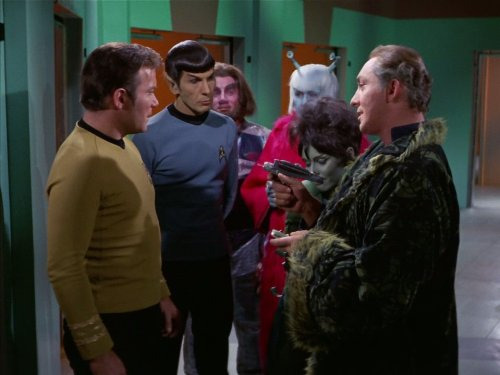
As is done with many examples of the soft science fiction (or speculative fiction) genre, Star Trek uses its setting and set-up to examine the problems with our own society through the disguise of another. Routinely, Kirk and the gang land on a planet or meet a people that represent a part of humanity that is less than pleasant to look at. Episodes like Let That Be Your Last Battlefield take a scathing look at racism, a huge social issue in the late 1960s. Other episodes examined topics like the Vietnam war, labor, and, a science-fiction favorite, the dangers of technology.
Add this onto the ‘traveling through the stars’ plotline of Star Trek, and you’ve got yourself a pretty good argument for a solid science fiction show, with or without the western elements to it. With that said, that doesn’t mean there’s more to the show than just sci-fi.
Star Trek’s storylines typically fell into the category of action or adventure. There were gunfights (or phaserfights), fistfights, chases, daring escapes, and space-battles galore. There was typically at least one hair-raising action scene per episode (with a few exceptions, such as The Trouble with Tribbles or The Way to Eden). Even the episodes without ‘action’ per say as it would later be solidified in shows like The A-Team or Magnum P.I. turned out a decent ‘adventure’ story, with emphasis on the journey and adventure as a whole, rather than action-packed sequences that kept audiences on the edge of their seat.
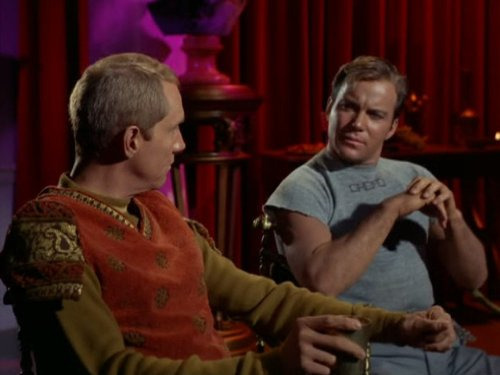
Star Trek was all about the adventure, as even the opening credits will make clear. The voyage of the Enterprise is aimed at discovery and exploration. The setup of the show is, at its core, the greatest adventure: exploring the unknown. Every episode is aimed at the exploration of the human experience and curiosity. By definition, an adventure is a risky undertaking, and the exploration of deep space and discovering new civilizations and planets is nothing if not risky.
It’s pretty easy to say that Star Trek fits pretty neatly into the ‘sci-fi/adventure’ category, although it does have shades of other genres. Episodes like Shore Leave, The Trouble with Tribbles, I Mudd, and A Piece of the Action have a distinct comedic slant to them, whereas episodes like Catspaw, The Enemy Within, Wolf in the Fold, and The Man Trap have a rather sinister, horror/thriller edge. Other episodes have dabbled into courtroom dramas, tragedies, westerns, and even war, giving all three seasons a wide range of types of stories that they tell. However, one genre that Star Trek has always been the absolute master of, even more than science-fiction or adventure, has been the genre of drama.
At the heart of every Star Trek episode, no matter how cerebral or action-packed, is an overarching sense of drama. Not drama in the ‘soap opera’ sense, mind you, but drama as in real character interaction and growth. The drama in Star Trek is in McCoy and Spock’s argument in Bread and Circuses, in the death of a recently married lieutenant in Balance of Terror, in the death of Kirk’s brother in Operation: Annihilate. Star Trek’s dramatic moments are rooted in character, from Spock’s admittance and sharing of Vulcan rituals in Amok Time and his muted desperation at thinking that he’s killed his Captain in a burst of uncontrollable rage to the doomed romance between Kirk and Edith Keeler in City On the Edge of Forever. The drama in Star Trek is in people, whether human or not.
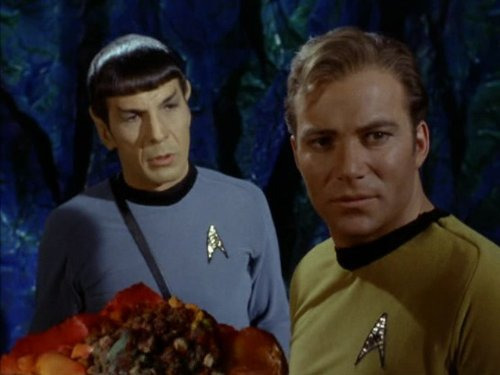
The examples of Star Trek’s use of characters, be they regular or not, is truly groundbreaking. From Spock’s mind-meld with the Horta in Devil in the Dark to Kirk’s terrifying identity crisis in The Enemy Within, Star Trek’s strength is in the people, in the personal dynamics between the characters, most notably between the main trio of Kirk, Spock, and McCoy. Even the other, more minor characters on the show received levels of characterization unheard of for the time: Sulu’s love of botany and retro weaponry, Uhura’s musical ability, Scotty’s intelligence and romantic troubles, and Chekov’s obsession with spouting totally innaccurate Russian history, possibly just to annoy the rest of the crew. Even Nurse Chapel’s flashes of snark helped her stand apart from the many nameless crew members who came and went throughout the series.
In short, Star Trek’s characters were people. Nowhere was this more evident than in Mr. Spock.
By the 1960s, most ‘alien’ characters on television were either jokes or monsters, cast as gimmicks in My Favorite Martian or as evil conquerors in shows like The Twilight Zone or The Invaders. But in Star Trek, the ‘alien’ was as ‘human’ as the rest of us, if you’ll pardon the phrase.
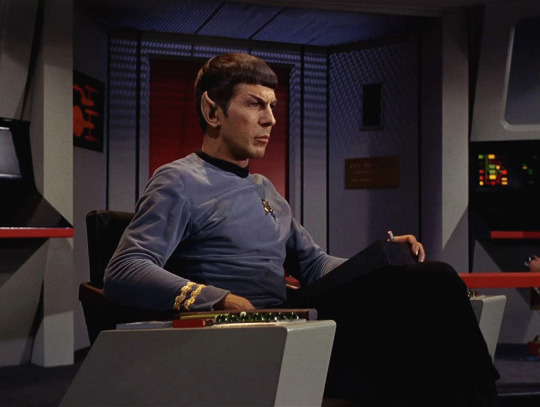
A Mr. Spock type character was unheard of in 1966. A half-human, half-alien, treated as a respected equal of the rest of the crew, was a completely foreign concept at the time. Spock’s development as a character, and indeed, his criticism of the human condition proved to be one of Star Trek’s best elements of its use of character and drama. Spock as a character was constantly at war with himself, torn between the outwardly emotionless Vulcan half, and his emotional, illogical human half. Spock’s internal struggle proved to be one of the most gripping elements of the show, and as his interactions with Kirk and McCoy proved, although Spock did not like to be compared to humans, in many ways, he was more ‘human’ than we are. His subtle flashes of emotion and occasional bursts of illogical behavior proved repeatedly that there was a lot more to Spock than what he tried to let on. He, along with the other members of the cast, had layers.
And Star Trek was very good at exploring those layers.
No science-fiction show would introduce characters with layers to explore if they hadn’t had every intention of making the show hang on the relationships of the characters. And the relationships of characters is the absolute core of drama.
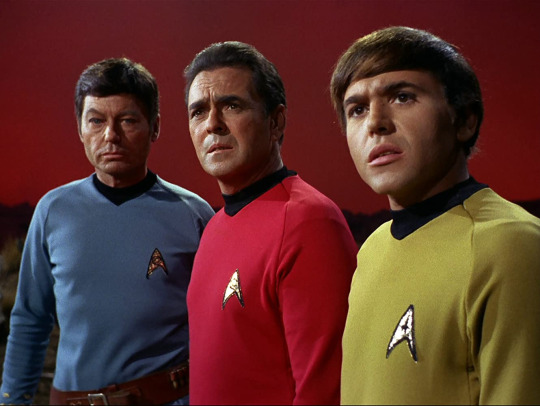
In the end, Star Trek is a science-fiction adventure drama, a speculative look at the nature of humanity and people in general. Star Trek is a look at a better future, an improved society turned to exploration. It’s about the new frontier, about the best and worst of humanity, about friendship, adventure, and morality, full of good and memorable stories and characters. It paved the way for even more complex shows to follow, and remains one of the most thought-provoking and earnest shows of all time.
Even now, audiences remember those characters, those stories, those little moments with these people that they grew to know. They hold up, remaining just as genuine and heartfelt as they were in 1966.
And they owe that, in no small part, to those wonderful characters.
But that’s a discussion for next time.
Thank you guys so much for reading! Don’t forget that my ask box is always open for conversation, suggestions, or questions. Stay tuned for the next article, where we’ll be looking at the crew of the Enterprise and their roles in Star Trek. I hope to see you there!
#Star Trek: The Original Series#Star Trek#Television#TV#TV-PG#60s#Drama#Action#Adventure#Sci-Fi#Science Fiction#William Shatner#Leonard Nimoy#DeForest Kelley#Nichelle Nichols#James Doohan#George Takei#Walter Koenig#Majel Barrett#Gene Roddenberry
28 notes
·
View notes
Text
So, I want to talk about Bread and Circuses. Or, I want to talk about Spock and McCoy in Bread and Circuses... plus the rest of the first half of the second season, because this episode isn’t actually good aside from the Spock and McCoy moments.
We start with this:
SPOCK: Fascinating. This atmosphere is remarkably similar to your twentieth century. Moderately industrialized pollution containing substantial amounts of carbon monoxide and partially consumed hydrocarbons.
MCCOY: The word was smog.
SPOCK: Yes, I believe that was the term. I had no idea you were that much of a historian, Doctor.
MCCOY: I am not, Mister Spock. I was simply trying to stop you from giving us a whole lecture on the subject. Jim, is there anything at all we know about this planet?
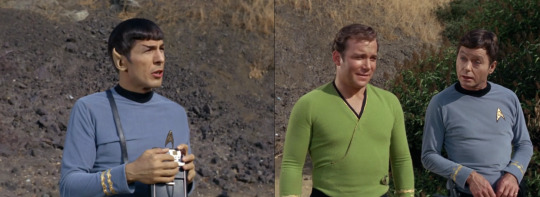
(This post got long--nearly 4000 words???--so here’s a cut to save your dashboard!)
Which is kind of an odd argument for them? McCoy gets on Spock for a lot of things, but not usually for talking too much. In fact, it’s usually the reverse. In Trouble with Tribbles (the previous episode by production order), they have this exchange:
MCCOY: Spock, I don't know too much about these little tribbles yet, but there's one thing that I have discovered.
SPOCK: What is that, Doctor?
MCCOY: I like them better than I like you.
SPOCK: Doctor?
MCCOY: Yes?
SPOCK: They do have one redeeming characteristic.
MCCOY: What's that?
SPOCK: They do not talk too much. If you'll excuse me, sir.
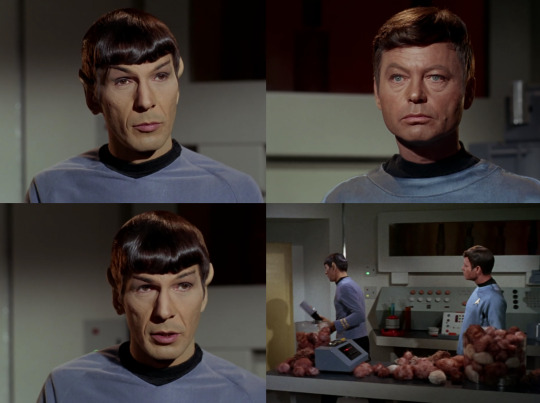
Far be it from me to accuse Star Trek of having continuity, but don’t these arguments seem related? In fact, both of these episodes have had particularly heated arguments between Spock and McCoy for no apparent reason in the plot. There are also a few heated exchanges in The Deadly Years (about Spock’s health, and then Kirk’s dementia).
Put a pin in this. Let’s return to Bread and Circuses.
MCCOY: Odd that these people should worship the sun.
SPOCK: Why, Doctor?
MCCOY: Because, my dear Mister Spock, it is illogical. Rome had no sun worshipers. Why should they parallel Rome in every way except one?
Let’s just ignore the fact that yes Rome did have sun worshipers and that there have been a hell of a lot more than one discrepancy, because if we talk about inaccuracies we’ll be here all day. The point is, they’re both postulating about this odd ‘parallel’ Earth, but McCoy’s interjection seems to annoy Spock for some reason... To the point that he brings it up again later, but in the meantime, they also have this exchange:
SPOCK: Even more fascinating. Slavery evolving into an institution with guaranteed medical payments, old-age pensions.
MCCOY: Quite logical, I'd say, Mister Spock. Just as it's logical that twentieth-century Rome would use television to show its gladiator contests or name a new car the Jupiter Eight.
SPOCK: Doctor, if I were able to show emotion, your new infatuation with that term would begin to annoy me.
MCCOY: What term? Logic? Medical men are trained in logic, Mister Spock.
SPOCK: Really, Doctor, I had no idea they were trained. Watching you, I assumed it was trial and error.
Hey guys, remember an episode called Amok Time (only 9 episodes earlier in production order instead of a whole season apart), where McCoy said this:
MCCOY: My orders were to give you a thorough physical. In case you hadn't noticed, I have to answer to the same commanding officer that you do. Come on, Spock. Yield to the logic of the situation.
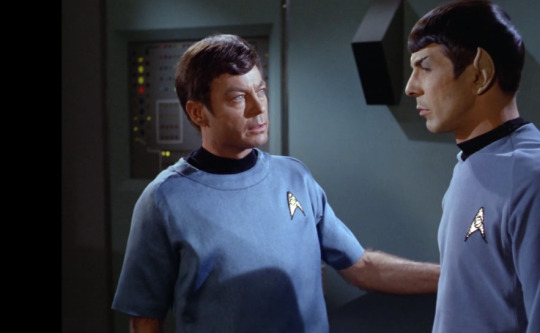
And it, y'know, worked to convince Spock to listen to him that time. BUT let's also look at I, Mudd where they have one of those curiously heated arguments again:
MCCOY: All right. There's something wrong about a man who never smiles, whose conversation never varies from the routine of the job, and who won't talk about his background.
SPOCK: I see.
MCCOY: Spock, I mean that it's odd for a non-Vulcan. The ears make all the difference.
SPOCK: I find your argument strewn with gaping defects in logic.
MCCOY: Maybe, but you can't evaluate a man by logic alone. Besides, he has avoided two appointments that I've made for his physical exam without reason.
SPOCK: That's not at all surprising, Doctor. He's probably terrified of your beads and rattles.
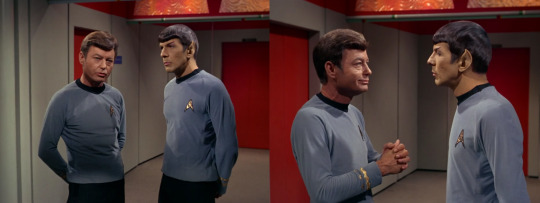
(Notice, McCoy realizes he’s offended Spock and immediately tries to fix it, but Spock remains annoyed with him.)
A couple of things here. First, like in Trouble with Tribbles (the next episode), Spock seems actually offended by McCoy. This was almost entirely absent from the first season, and not particularly prevalent in the first few episodes of the second season. There was plenty of banter and teasing before, but Spock seems more sensitive to it in this middle section of the second season. Then, again, McCoy brings up logic. McCoy argues that logic can't be the only means to evaluate a person. Then, Spock insults McCoy's medical skills. AGAIN, this is a newer development that makes it into almost every episode in the middle of the second season, including I, Mudd, Trouble with Tribbles, and Bread and Circuses. All back-to-back episodes in production order!
So we have some things repeating in their arguments over multiple episodes. McCoy's interpretation of logic, Spock being offended by McCoy's teasing/insults, and Spock insulting McCoy's skill as a doctor. PUT A PIN IN IT. Returning to Bread and Circuses again.
MERIK: There's been no war here for over four hundred years, Jim. Could, let's say, your land of that same era make that same boast? I think you can see why they don't want to have their stability contaminated by dangerous ideas of other ways and other places.
SPOCK: Interesting, and given a conservative empire, quite understandable.
MCCOY: Are you out of your head?
SPOCK: I said I understood it, Doctor. I find the checks and balances of this civilization quite illuminating.
MCCOY: Next he'll be telling us he prefers it over Earth history.
SPOCK: They do seem to have escaped the carnage of your first three world wars, Doctor.
MCCOY: They have slavery, gladiatorial games, despotism.
SPOCK: Situations quite familiar to the six million who died in your first world war, the eleven million who died in your second, the thirty seven million who died in your third. Shall I go on?
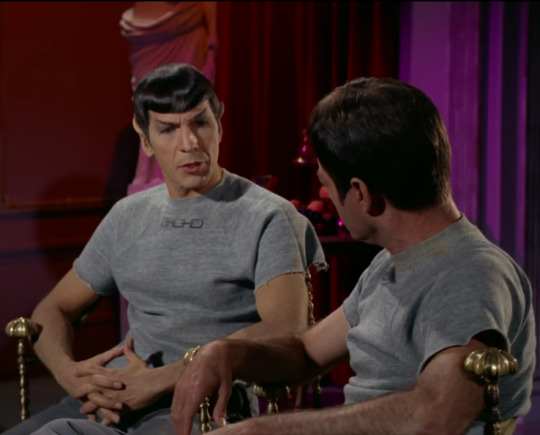
I think this is one of the better exchanges that speak to the themes of this episode, which they should’ve elaborated on but instead went the Jesus Saves route... Whatever. The important thing is that this is another example of their philosophical differences AND very similar to an argument they had in The Apple a few episodes ago.
SPOCK: In my view, a splendid example of reciprocity.
MCCOY: It would take a computerized Vulcan mind such as yours to make that kind of a statement.
SPOCK: Doctor, you insist on applying human standards to non-human cultures. I remind you that humans are only a tiny minority in this galaxy.
MCCOY: There are certain absolutes, Mister Spock, and one of them is the right of humanoids to a free and unchained environment, the right to have conditions which permit growth.
SPOCK: Another is their right to choose a system which seems to work for them.
MCCOY: Jim, you're not just going to stand by and be blinded to what's going on here. These are humanoids, intelligent. They need to advance and grow. Don't you understand what my readings indicate? There's been no progress here in at least ten thousand years. This isn't life. It's stagnation.
SPOCK: Doctor, these people are healthy and they are happy. What ever you choose to call it, this system works, despite your emotional reaction to it.
MCCOY: It might work for you, Mister Spock, but it doesn't work for me. Humanoids living so they can service a hunk of tin.
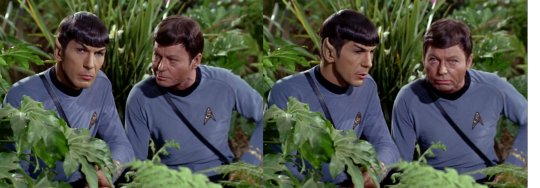
It’s super interesting to me that Spock is using relativistic contract theory to judge these cultures while McCoy is just a straight up anarchist, let’s be real. He hates hierarchical structures and authority figures, and believes that they go against human nature. Which you might say is weird for a Starfleet officer, but he also yells at people above his rank constantly and gets really upset in episodes like The Doomsday Machine when Spock refuses to ignore rank. He’s in Starfleet because he wants to help people, but I can’t imagine him staying if his captain weren’t someone he totally trusts. I mean, you could forget that McCoy has any rank at all with the way he carries himself. Meanwhile, Spock is Very, Very strict in his understanding of hierarchy and rank.
This is one of those deep divisions between the two of them. Put a pin in it. Let’s move on to the gladiator fight.
SPOCK: Need any help, Doctor?
MCCOY: Whatever gave you that idea?
ACHILLES: Fight, you pointed-ear freak!
MCCOY: You tell him, buster. Of all the completely ridiculous, illogical questions I ever heard in my life!
The fact that McCoy is not a fighter is really brought out in this episode, and I have a lot to say about it in another post. The main thing here is McCoy bringing up logic again and agreeing with an argument that is, in my opinon, a step beyond something that McCoy would actually say. He makes fun of the ears, but freak is a little far, I think.
And all of this leads to the Big Scene in the prison, which I will break into parts. Part #1:
MCCOY: Angry, Mister Spock, or frustrated, perhaps?
SPOCK: Such emotions are foreign to me, Doctor. I'm merely testing the strength of the door.
MCCOY: For the fifteenth time...
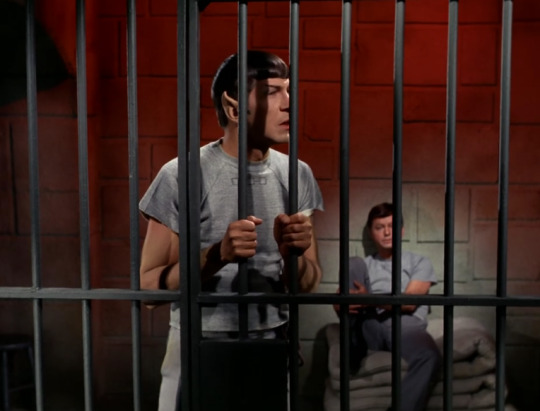
McCoy is lightly teasing Spock for being more emotional than he lets on, while Spock denies having any emotion at all... this is a pretty typical part of the exchange. What really makes it work is Deforest Kelly's delivery. He says these lines with a degree of affection. He's not yelling, and he's not even using the tone he usually has when teasing Spock. In this moment, you can see that McCoy points out Spock's incongruous moments of emotion because he likes that about him. While it sometimes comes across as a 'gotcha' moment (like at the end of The Galileo Seven), the sheer number of times McCoy mentions Spock's emotions shows more than just a passing amount of interest in them.
Then, McCoy continues:
MCCOY: Spock, I know we've had our disagreements. Maybe they're jokes. I don't know. As Jim says, we're not often sure ourselves sometimes, but what I'm trying to say is--
SPOCK: Doctor, I am seeking a means of escape. Will you please be brief?
MCCOY: Well, what I'm trying to say is you saved my life in the arena.
SPOCK: Yes, that's quite true.
MCCOY: I'm trying to thank you, you pointed-eared hobgoblin!
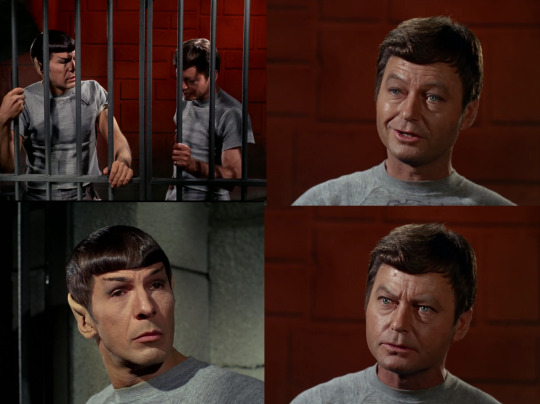
Before I talk about this, I need to take a moment. I think that McCoy often gets painted at someone with his heart on his sleeve, who feels a lot and expresses all of his feelings. And it's just not true! He's very expressive when it comes to some things, sure. He can yell all day about how much he cares about people in general, but when it comes to expressing how much he cares about an individual? It's pretty damn rare. Look at his words AND his body language in Balance of Terror when he has a vulnerable moment with Kirk.
KIRK: I look around that Bridge, and I see the men waiting for me to make the next move. And Bones, what if I'm wrong?
MCCOY: Captain, I--
KIRK: No, I don't really expect an answer.
MCCOY: But I've got one. Something I seldom say to a customer, Jim. In this galaxy, there's a mathematical probability of three million Earth-type planets. And in all of the universe, three million million galaxies like this. And in all of that, and perhaps more, only one of each of us. Don't destroy the one named Kirk.
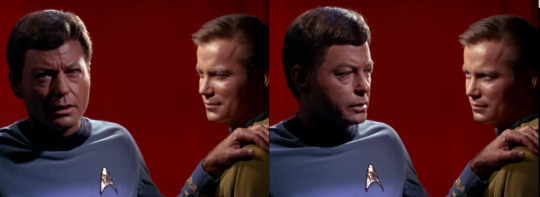
McCoy himself says here that he doesn't usually say this kind of thing, and if you look at the series, that bears out. He does NOT find it easy to tell people he cares about them, and when he does, he does it in this abstract way, barely able to make any eye contact. This is AGAIN why the conflict between Spock and McCoy is NOT logic vs. emotion. McCoy is not fully emotional, and he doesn't find emotion easy to express. I would argue that he has almost as much difficulty expressing his feelings for another person as Spock does. I would also argue that McCoy does not LIKE this about himself, and that is part of why it frustrates him so much when he sees it in Spock.
So, when he tries to be vulnerable and thank Spock, first of all, he doesn't just say "Hey, thanks for saving me in the arena." He starts with a lot of waffle, and when Spock interrupts him and insists that he keep it short (again, callback to the arguments in this episode and Trouble with Tribbles about which one of them talks too much), McCoy tries to simply thank him, but gets upset when Spock is still impassive and reverts to his usual way of talking to Spock. One remark from Spock, and McCoy loses his ability to be vulnerable and resorts to a sharp tone and insults. Leading into part three of this conversation:
SPOCK: Oh, yes. You humans have that emotional need to express gratitude. You're welcome, I believe, is the correct response. However, Doctor, you must remember I am entirely motivated by logic. The loss of our ship's surgeon, whatever I think of his skill, would mean a reduction in the efficiency of the Enterprise and therefore--
MCCOY: Do you know why you're not afraid to die, Spock? You're more afraid of living. Each day you stay alive is just one more day you might slip and let your human half peek out. That's it, isn't it? Insecurity. Why, you wouldn't know what to do with a genuine, warm, decent feeling.
SPOCK: Really, Doctor?
MCCOY: I know. I'm worried about Jim, too.
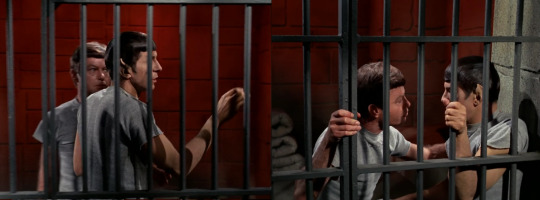
The last bit is powerful, and I think generally something people remember more than the rest of the conversation, but I really need to focus on that first exchange first, because there is a LOT going on, and I've been pinning things through this whole overly long post for this moment.
PIN 1: Their arguments have become more heated in the middle portion of season 2.
This is a very clear example of that. McCoy doesn't drop the issue after the insult and Spock insists he wouldn't have saved McCoy if he weren't logically useful to the ship. Ouch.
PIN 2: The repetition in these heated arguments. McCoy's view of logic, Spock getting offended, Spock insulting McCoy's skill as a doctor.
What Spock says here brings up all three of those issues. Spock has been frustrated by McCoy bringing up logic throughout this episode, and now he's shooting back at him with a logical view of why he saved McCoy's life--while still maintaining that he doesn't think McCoy is a good doctor. McCoy's been using logic against him, and now Spock is returning the favor. Spock understands Human interaction better than this! Something as simple as a "thank you" and "your welcome" is everyday for him, not only on the Enterprise but with one of the people who RAISED him. He is exaggerating his own non-Human qualities throughout this conversation to a truly absurd extent, because McCoy has repeatedly offended him for several episodes. However, McCoy seems unaware that his usual teasing has actually gotten under Spock's skin, because he has been surprised, again and again (especially in I, Mudd where he chases after Spock to apologize to him) when Spock actually acts hurt by him.
And then there's McCoy's response.
It's not "damn your Vulcan logic" or ending the conversation. He grabs Spock and forces him to look at him--which Spock has been avoiding throughout the conversation--and tells Spock that he's so afraid to be human that he doesn't fear death, because that would put an end to the fear that his Human side would show.
IF WE ARE ONLY LOOKING AT THIS ONE EPISODE, this doesn't make sense. This didn't build from the conversations in Bread and Circuses, which is why I keep bringing up several different episodes and why I'm insisting on production order.
PIN 3: These two have deep, deep philosophical differences that they are constantly discussing.
As I said in another post, Spock and McCoy have a different standard for morality which causes the two of them to butt heads a whole lot. In the first season, it was pretty much the same argument over and over again (should we risk a larger number of people to save a smaller number of people), but it's been evolving in this season to the discussion of freedom and cultural differences and more.
If these two men did not have any respect for one another, I don't think these arguments would continue. Yes, they work together, but they don't actually need to interact as much as they do, and they are VERY often seeing walking into a scene on the bridge together or walking down a corridor together, etc. It's not just missions. They choose to spend time together.
So, when Spock says he only saved McCoy because he's useful as the ship's surgeon, McCoy doesn't respond to THAT, because 1) he knows he's a good doctor and never seems fazed by Spock insulting him about that and 2) he knows Spock is not being honest with him here.
This is one of the reasons why I think McCoy gets frustrated with Spock because they have a similar difficulty showing how much they care about other people, and they have an especially difficult time showing affection toward one another.
While the ending of Operation: Annihilate! where McCoy tells Kirk not to tell Spock he called him the best first officer in the fleet is memorable, it's hardly the most vulnerable moment for McCoy in that episode. No, it's when he thinks he's blinded Spock because he didn't consider using the non-visible parts of the light spectrum to kill the parasitic aliens. McCoy can't even say for himself the deep guilt he's feeling about harming Spock--he never says that he's blaming himself. It's Kirk who tells him he's not at fault, and McCoy can't even bring himself to respond. If you look at those last lines about Spock being the best first officer in the fleet in context of how devastated McCoy was when he thought he'd blinded Spock permanently, it definitely hits different, right?
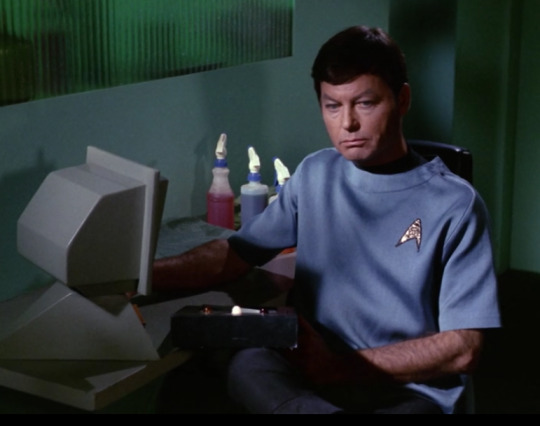
And then there are the times in the first season when Spock believes McCoy is badly hurt or dead. In Miri, Shore Leave, and City on the Edge of Forever, Spock has a strong reaction to seeing McCoy injured, but he does not verbalize this obvious emotional reaction at any time.
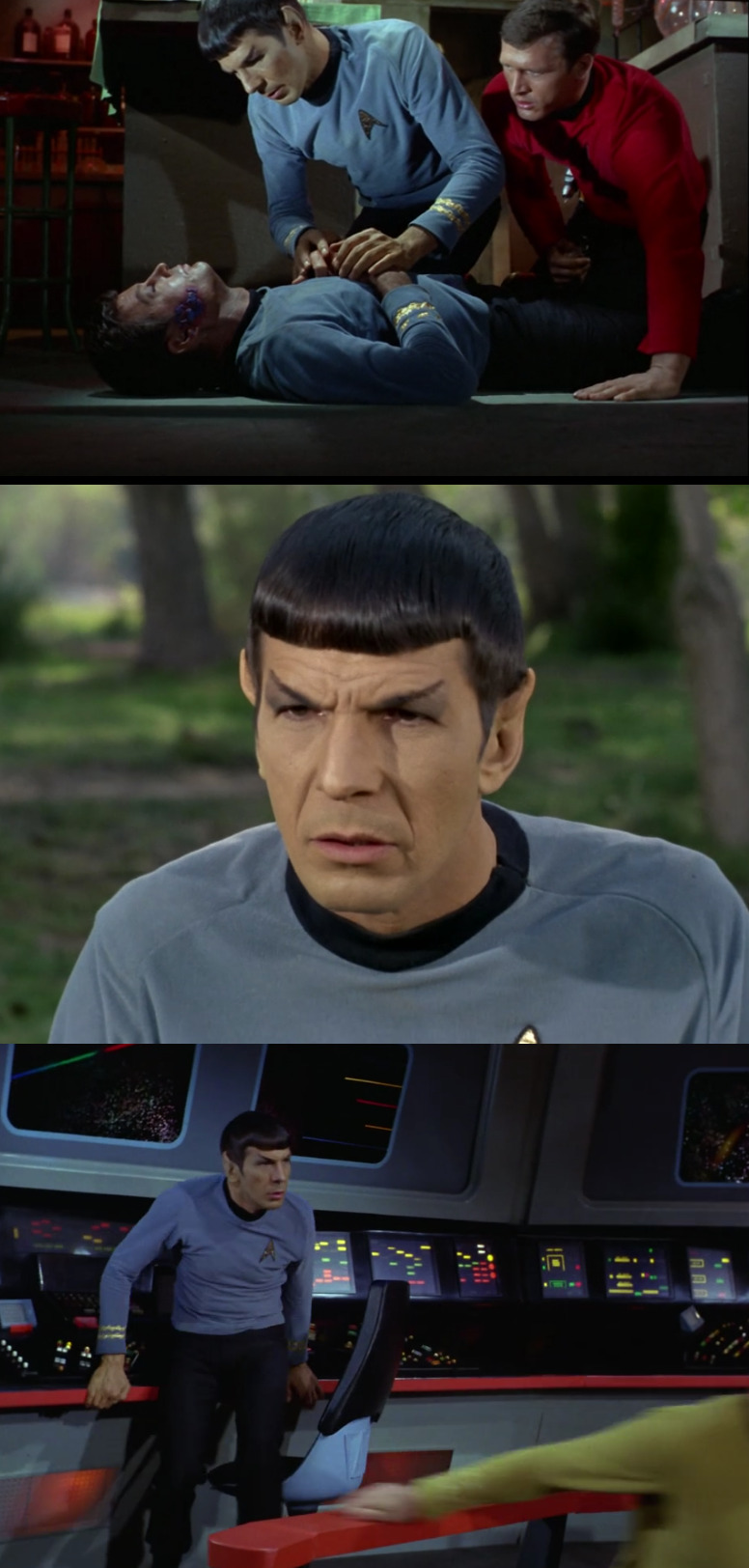
They don't know how to say that they care about each other, because that's something they both struggle with in general. They also both struggle with being emotionally vulnerable and allowing other people to know them on a deeper level. Spock uses his Vulcan otherness to keep people at a distance, while McCoy uses a the charm offensive of his "bedside manner" as his defense system.
So, McCoy says this thing about Spock not being afraid to die because he's so terrified of his Human side coming out IN DIRECT RESPONSE to Spock being unable to even look at him when McCoy is not only trying to thank him for saving his life but ALSO putting it into the context of how difficult their friendship is and how rarely they show any straight-forward affection for each other. And the most telling thing is, McCoy didn't seem to know for sure that he was right until he sees Spock’s reaction. Look at his expression when Spock turns away from him.
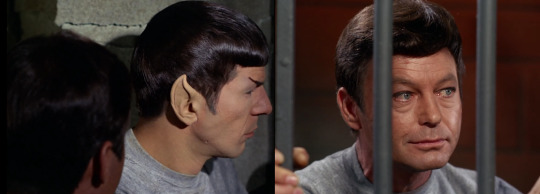
And look at his intensity when he says that Spock wouldn't know what to do with a "genuine warm, decent feeling."
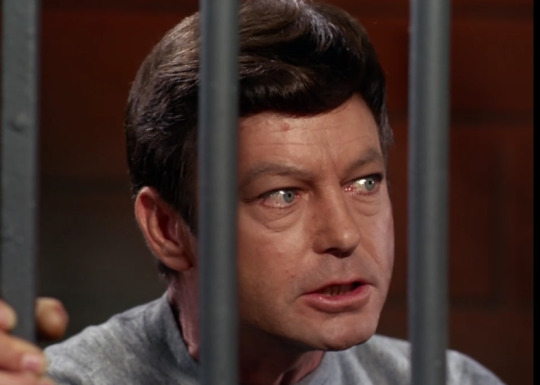
When Spock turns to him and says "Really, Doctor?"
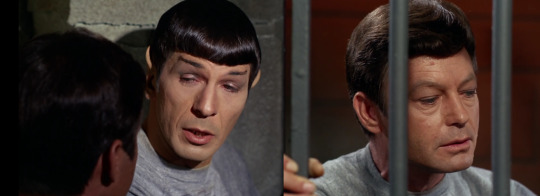
THAT is when McCoy is the one who breaks eye contact and changes the subject to someone that they both feel affection for, but who isn't in the room to hear it. I understand that there are other readings of this moment, and that's fine, but... I don't think this has to do with Kirk specifically. For one thing, it never comes up in the episode when they are reunited with Kirk, and for another Kirk is in the least danger out of the three of them. Instead, this moment is about how both of them struggle so deeply with showing affection when someone's right there in front of them.
By the end of the episode, we can see the two of them spending time together again, apparently by choice, and seeming very comfortable with each other... and the next episode is Journey to Babel, in which they are very friendly again with The Immunity Syndrome only four episodes after that, and the episodes in between showing them with much less contentious banter again.
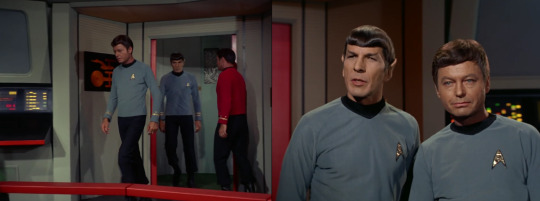
Dare I say it, but I think this is a legitimate arc! And it's a shame that most people see the episodes in broadcast order, because it makes their relationship much more incoherent and makes this little escalation of frustration with each other more random and may make it seem like they genuinely dislike each other.
Anyway... this was. Not supposed to be such a long post, but I have a lot of Thoughts and Feelings about these two, and I can't help myself sometimes.
#spones#long post is long#meta#spock#leonard mccoy#star trek#please read this i spent so long writing it that it got dark outside
143 notes
·
View notes